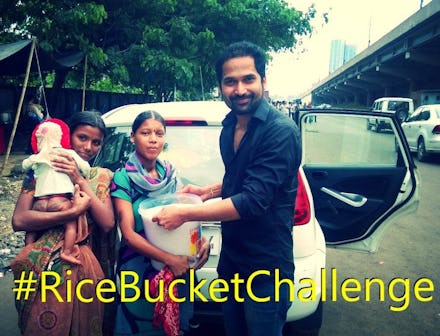India's Version of the Ice Bucket Challenge Is Way Better Than the Original

Move over Ice Bucket Challenge and make room for the Rice Bucket Challenge.
By now, anyone on social media has seen the Ice Bucket Challenge and probably heard that it's helped raise a reported $70 million for the ALS Association. India spun the challenge on its head and came up with a much less wasteful way to give to people in need.
Meet the Rice Bucket Challenge.
After seeing the dramatic results from the Ice Bucket Challenge, Indian journalist Manju Latha Kalanidhi was compelled to start something similar, but with an Indian slant. "I felt like doing something more locally tangible. Rice is a staple here," Kalanidhi told CNN. "We eat it every day, we can store it for months. Why not donate rice to someone who is hungry?"
It's fairly simple: The challenge swaps ice for rice. In India, where clean water is scarce, many people are conserving water. So in lieu of drenching themselves with cold water, they are donating a bucket of rice to people in need.
The campaign urges people to post their experience participating in the #RiceBucketChallenge on Facebook because, as the accompanying literature being circulated says, "small drops make an ocean." And the movement is gaining momentum. Twitter and Facebook are seeing an onslaught of videos, pictures and praise for the campaign.
The Facebook community page was so overwhelmed by the outpour of support that Tuesday morning it posted: "Friends, we are unable to post many pictures as we are flooded with messages. Will take time to respond to each of you. Please bear with us."
The background: The ALS Ice Bucket Challenge has been an incredibly powerful platform since it began on July 29. The viral campaign has raised awareness about the "progressive neurodegenerative disease that affects nerve cells in the brain and the spinal cord," according to the ALS Association website, and brought a flood of donations to the charity.
However, dumping water on someone's head is also a wasteful practice. California residents have taken to dumping dirt on themselves rather than squander precious water. A journalist in Gaza thought that water was too valuable to misuse and poured rubble on himself instead.
Actor, writer, producer and philanthropist Matt Damon poured toilet water on himself after being nominated for the Ice Bucket Challenge. He highlighted the developing world's problem of lack of access to clean water and sanitation, contrasting it with America's incredibly clean toilet water.
India's own translation of the act is an iteration that preserves its much-needed water supply and turns the conversation toward poverty in the country.
The takeaway: Individuals and celebrities, such as Bill Gates and Mitt Romney, have all taken the plunge to pour ice-cold water on themselves in the name of fighting ALS. India's Rice Bucket Challenge just takes it one step to the side and one step forward.
India faces rampant problems of poverty, access to potable water sources and hunger issues. By charitably donating rice to people who need it, the Rice Bucket Challenge can help alleviate the problems of the 400 million people who live in poverty and the 210 million who are starving.